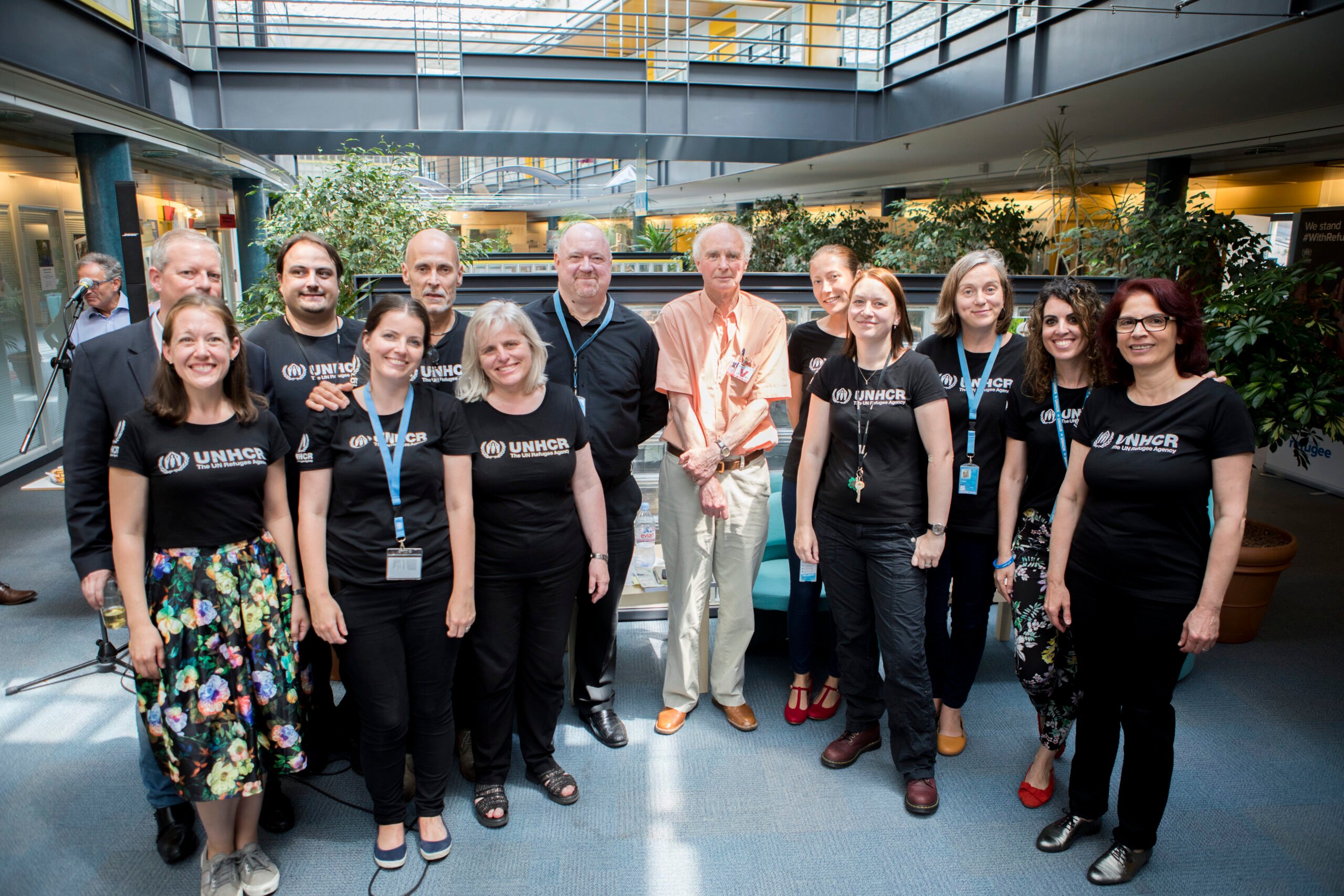By Motahareh Mohebi
In every journey, countless stories are born. Imagine being an envoy for over 27 years with a humanitarian organization like UNHCR – how many tales await narration? Beyond that, consider the wealth of valuable information one can accumulate for research or organizational purposes. Nicholas Morris was one such precious staff member who worked for UNHCR from 1973 until 2001, with hundreds of fascinating stories to share.

International Archives Day event at Headquarters. From left to right: Deputy High Commissioner Kelly T. Clements; John Horekens; Director of the Division of External Relations, Rossella Pagliuchi-Lor; Nicholas Morris; MENA Director, Amin Awad; the High Commissioner Filippo Grandi; Gerald Walzer; Anne Willem Bijleveld; and the Director of the Europe Bureau, Pascale Moreau. ©UNHCR/Susan Hopper
Morris was involved in several history-making events during his UNHCR tenure, including operations in Indian sub-continent repatriation operation (1973-1974), Cyprus (1974-1975, 1977-1978), planning for repatriation to Namibia (1978-1979), and overseeing Southern Rhodesia’s transition to independence as Zimbabwe (1979-1980). He served as the UNHCR Representative in Sudan (1983-1986) and Chief of Mission in Pakistan (1991-1992). Morris was also the High Commissioner’s Special Envoy after the first Gulf War (1991), for repatriation to Afghanistan (1992-1993), and for the former Yugoslavia (1993-1994, 1998-1999). He concluded his career as Inspector General (1999-2001).
What makes Morris truly unique is not only his experience but also his habit of meticulous documentation. As John Horekens, former UNHCR’s Regional Bureau for Europe, noted, Nicholas always wrote everything down. From the early days of his UNHCR career, he wrote letters to his parents and documented his job and missions in several notebooks. Fortunately, he decided to compile this information into a book titled “As it happened,” with the first edition containing six interesting accounts and the second edition featuring eight.
Recognizing that the Records and Archives Section is perhaps the best home for his stories, Nicholas donated his collection to the UNHCR Archives between 2016 and 2017. On June 11, 2018, Montserrat Canela Garayoa, chief of the Records and Archives Section, and her team organized the first celebration of International Archives Day. Nicholas presented his collection and gave a speech at this event. During the celebration, Filippo Grandi, UNHCR High Commissioner, described Nicholas Morris as “an incredible repository of the history of UNHCR.”

Director of the Division of External Relations, Rossella Pagliuchi-Lor (left), and Nicholas Morris (right). ©UNHCR/Laura Bernier
Current staff members of the Records and Archives Section at UNHCR believe that connecting with former colleagues like Nicholas Morris brings the organization’s archives to life, offering a personal, “lived-through” perspective on events that are otherwise only known through documents. They find that Morris’s kindness, approachability, and extensive involvement in important events make him a valuable living memory for UNHCR, highlighting the potential for greater engagement with former staff members, especially those who witnessed early periods of organizational change.

The UNHCR archives team and Nicholas Morris. ©UNHCR/Susan Hopper
The book “As it happened” includes the following accounts:
- The Sub-Continent Repatriation Operation 1973-4
- Cyprus 1974-5 and 1977-8
- Namibia Missions 1978-9 and 1989
- Southern Rhodesia 1979-1980
- The 1984-5 Sudan refugee emergencies [1]
- UNHCR in Crisis 1989-90
- The Aftermath of the 1991 Gulf war
- Afghan Refugees in 1991-3: a Personal View
- UNHCR and the 1997 UN Reforms
The book is accessible here: As It Happened
[1] This chapter was added in November 2024
